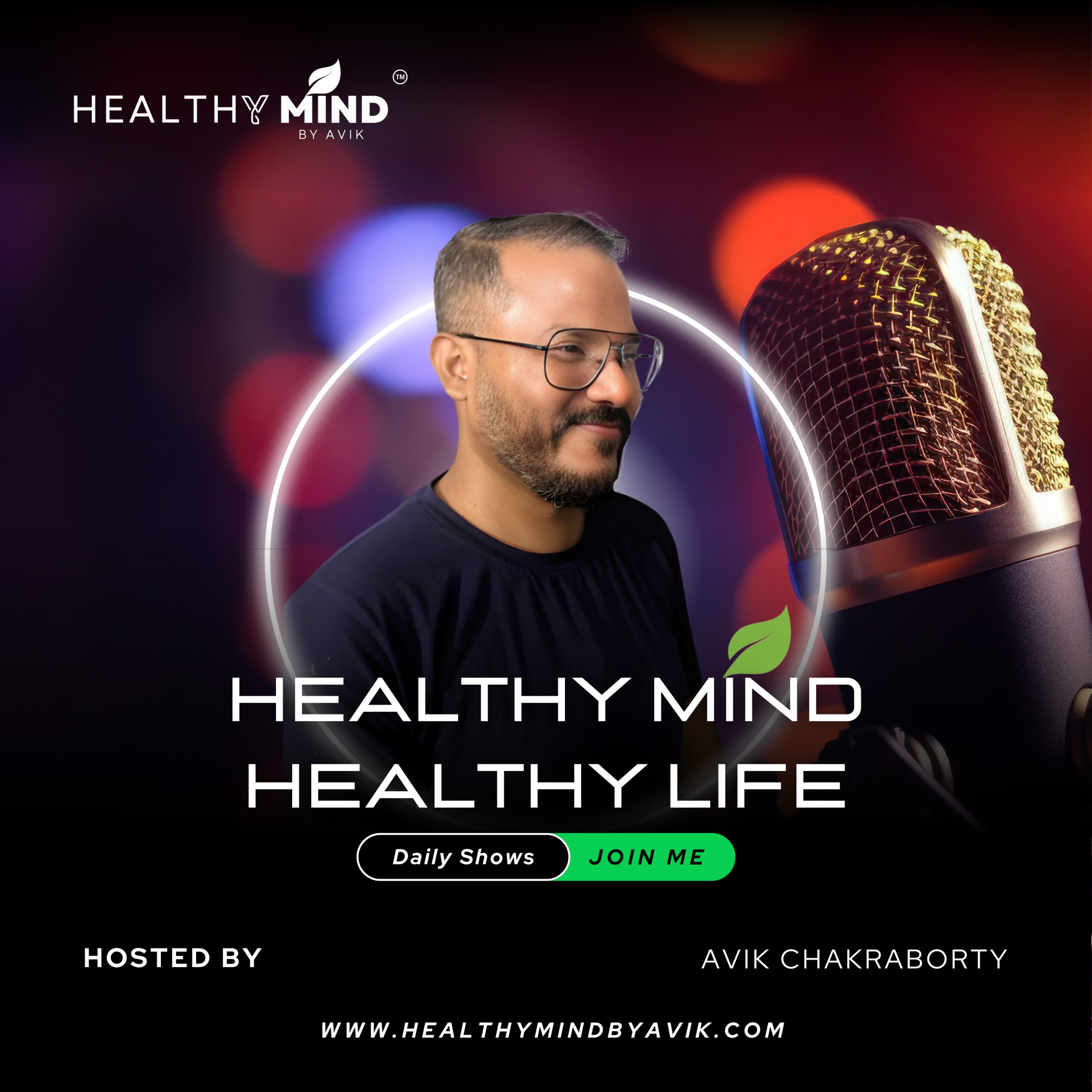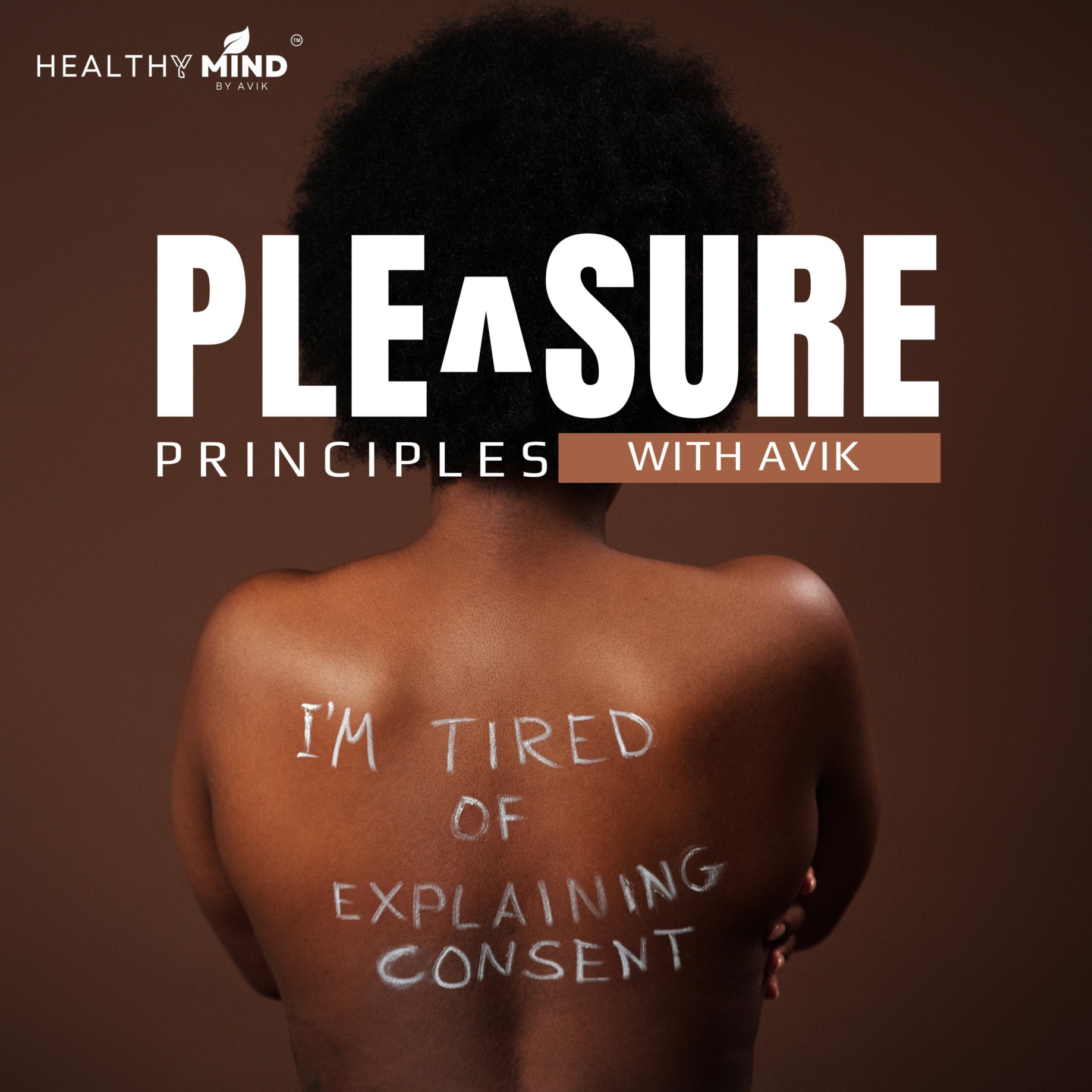
Mind Over Masculinity
Let’s stop asking men to "man up" and start asking how we can lift them up. After all, mental health is not just a women’s issue or a men’s issue—it’s a human issue.
Take the first step today. Talk, listen, and advocate. Together, we can make a difference.
Mind Over Masculinity
Healing From The Inside Out: How Digestive Health Transforms Men's Lives
Gut health forms the foundation of masculine vitality, yet most men ignore this crucial system until crisis strikes. In this raw conversation with holistic nutrition coach Brian Hardy, we uncover how digestive wellness directly impacts everything from mental clarity to emotional resilience.
Brian's journey began with a near-death experience at 18 when his appendix ruptured – a wake-up call that transformed his understanding of health from the inside out. He shares how this medical emergency led him to discover that most men normalize pain, fatigue, and brain fog as "just part of life" when they're actually warning signals of deeper imbalances.
The science is clear: neurotransmitters like serotonin and dopamine, which regulate our mood and motivation, are largely produced in the gut. When digestive health suffers through poor nutrition, stress, or inflammation, it creates a direct pathway to mental health challenges. For many men, anxiety, depression, and mental fog aren't just psychological issues – they begin in the digestive tract.
Perhaps most fascinating is how emotional suppression physically manifests in men's bodies. Brian reveals how his own religious upbringing created sexual shame that contributed to digestive problems years before his appendix crisis. This mind-body connection demonstrates why healing often requires addressing both physical symptoms and emotional patterns simultaneously.
For those ready to transform their health, Brian offers three immediately actionable practices: conscious breathing before meals to activate proper digestion, morning hydration to recharge cellular function, and gentle movement to stimulate the lymphatic system. These simple yet powerful techniques form the foundation of the Vital Man Method that has helped countless men reclaim their energy and clarity.
Ready to stoke your inner fire? Visit revitalizedman.com/MOM for free resources including Brian's testosterone optimization guide and digestive breathwork practice. Your journey toward true masculine vitality starts with healing from within.
-----------------------------------------------------------------------------------------------------------------
Want to be a guest on Mind Over Masculinity? Send me a message.
-----------------------------------------------------------------------------------------------------------------
Stay Tuned And Follow Us!
- YouTube - https://www.youtube.com/@healthymind-healthylife
- Instagram - https://www.instagram.com/podhealth.club/
- Threads - https://www.threads.net/@podhealth.club
- Facebook - https://www.facebook.com/podcast.healthymind
- LinkedIn - https://www.linkedin.com/in/newandnew/
What's up legends. Welcome back to another episode of Mind Over Masculinity, the podcast where we rip the lid off the silent struggles of being a man and step into real, raw and resilient conversations. That moves us towards strength, clarity and the connection. Now, today's episode is fire, and not the kind that comes from the burrito you regretted. So we are diving into men's health through the gut, and I don't mean just eating salads and taking the probiotics, but I'm talking about that deep gut level transformation that turns brain fog into focus, fatigue into fire and shame into strength. So, and with me today is a man who has lived this work, brian Hardy. So welcome to the show, brian.
Speaker 2:Thank you so much, Avik, for having me. I'm very excited to connect today.
Speaker 1:Lovely, lovely. So, brian, like before we start, I'd quickly love to introduce you to all of our listeners. Dear listeners, brian is a holistic health and nutrition coach and the creator of the Vital man Method. So, after a near-death experience in 2010, when his appendix ruptured, he went full throttle on a journey to master the connection between digestion, energy and masculinity, energy and masculinity. And he's not just tossing you the kale and telling you to meditate, but he is blending the science, soul and the shamanic wisdom into a blueprint for lasting change. So grab a seat, drop the ego, because it's very important, and open your mind, because this conversation just might change your life. So I'll not take much of your time, dear listeners. So let's get it right. What on the brian? Welcome to the show, brian thank you so much.
Speaker 2:Thank you for the introduction and for the opportunity to share and connect with your awesome audience lovely, lovely, lovely.
Speaker 1:So, brian, like your story is definitely wild and nearly dying, living in the Amazon, helping men heal from the inside out. So if you can take us back to that moment when your appendix ruptured, like what was going through your mind and how did it shape your path forward?
Speaker 2:Yeah, thank you for the question. So to go back there, I was 18 years old at the time. I was in my first year of post-secondary education at a world-renowned institute called McMaster University and I was just living life as a normal kind of university kid. And it was the first week of the second semester and I felt really sick. I felt like I had some kind of a weird flu or a fever. I was in bed for like four days, vomiting, couldn't eat anything, couldn't go to the bathroom, but I never clued in that something you know deeper might be going on. I just felt kind of weird and eventually, after that fourth day, the pain became so intense in my stomach that I thought, okay, something is definitely wrong and I should get some help immediately. So I called the cab. I didn't think I could walk to the hospital, which was like if I was healthy, it's maybe a seven, eight minute walk to the campus hospital, but I was not in any shape to do that. So I called a cab. It's like 3 am in the morning, they take me there, they check me in, and basically I was sitting in that waiting room trying to just deal with this pain. I had never experienced anything like that and I have a very high pain tolerance. I've broken bones before. I had never experienced anything like that and I have a very high pain tolerance. I've broken bones before. I've dislocated joints before.
Speaker 2:I was into extreme sports for my whole childhood, but this was different. This felt like my insides were on fire, like imploding, and I came to realize afterwards that they kind of were, because I suspect that was the exact time that the actual rupturing of the appendix was taking place. And it was the only time, and one of the few times in my life where I honestly thought I could understand why people want to, you know, check out and kill themselves, because this pain is intense and if something doesn't change, I don't know how long I can. I can stay with this Um, which was very, you know, kind of shocking thought to cross my mind, because up until then I'd been, you know, quite content. I didn't have the easiest time in school, um, but I was quite content. I was quite a, you know, easy to please individual. But that was, that was wild.
Speaker 2:But what ended up happening there was that the doctor I saw completely misdiagnosed me, completely missed that my appendix was an issue, gave me a ton of uh, of painkillers, uh, and did an x-ray and, you know, didn't see anything on an x-ray because it's not going to show you much except broken bones and so forth, and then sent me home. They said, okay, you can go home and you probably need to sleep this off for a few days, but you know you'll, you'll be fine. And I was in a state of shock and disbelief and fatigue and I was, you know, now on this heavy dose of opiates. Um, there's this kind of confused. Anyways, I went to a second hospital. They did a CT scan. They said you're a mess, we have to do surgery immediately. Hopefully it's just your appendix, but it could be much worse.
Speaker 1:And you know.
Speaker 2:That's it. We're going into surgery and I spent the next 11 days in that hospital in recovery and there was a tremendous amount of infection in my abdomen and because of that, I had to be on massive amounts of antibiotics for weeks. After that time as well. They had to allow the wound to heal from the inside secondary healing so I had a big open, infected wound on my abdomen for that was weeks, if not like a month or so, after that.
Speaker 2:So it was just a long, hard road of recovery and a lot of questions started to go through my mind in terms of why did this happen? How did this happen? How could I have prevented this from happening? And all the questions that, all the answers, rather, that I got from the nurses and the doctors who were helping me were very unsatisfying. They weren't specific. They said, oh, it's kind of just genetic, it kind of just happens, but you know, don't, don't worry about it too much. And I was like, well, clearly I almost died and if it wasn't for you guys saving my life, I wouldn't be here, and so I want to know why that happened.
Speaker 2:That's important to me, and ever since that time I've been basically obsessed with all things natural health, nutrition, men's health, herbal medicine, you name it All the things that we can use to turn around a challenging time and to feel and live with the kind of energy and strength and vitality that I believe we are designed for. I think that's the way our bodies are meant to function, I believe we are designed for. I think that's the way our bodies are meant to function, and it's only in modern you know, modern days, where we think of this as common, that we have all these chronic health conditions, which is totally abnormal and totally, you know, telling us that something is wrong.
Speaker 1:True, Exactly Okay, Exactly so. Like do you think that most men need?
Speaker 2:a rock bottom moment to finally pay attention to their health. In my experience that has been the case Both for myself, because I was into health I was into more so into the fitness side of things before I got sick but I became obviously much more aware of my health just given all the challenges that I went through after the surgery, and that was things like yeast, overgrowth and brain fog and no libido and just always tired and just not digesting food, and that took many years to unravel and to correct. And so for me it was certainly the case. And for the majority of guys I see they do need something, whether it's an actual diagnosis from a doctor or it is just you know, they've been, you know, feeling not like themselves, their energy is, is is the very low, their mood is very low, or they're always finding themselves frustrated and having no patience with their wife or their kids or in their business. There has to be some kind of moment that kind of shakes them and wakes them up and says you know, pay attention.
Speaker 2:Essentially, yeah, the vast majority of the time. I think that is required. Unfortunately, I wish it wasn't the case. Understand yeah, the vast majority of the time. I think that is required, unfortunately. I wish it wasn't the case.
Speaker 1:Understand yeah, definitely. So, like I mean definitely, I have to mention here it's like it is very powerful and I think a lot of guys who are listening might feel that like they are functioning, but one step away from burning out. So it's very wild how we normalize that pain until it slaps us hard. So, yeah, exactly.
Speaker 2:Yeah, well, that's just the thing.
Speaker 2:If I could add to that, it's like when I talk to somebody, they're in that place where they haven't had a true crisis, right.
Speaker 2:They haven't had something that really knocked them down for like weeks or months at a time, but they can sense that they're not far off. Um, I always use that opportunity to highlight how much of an opportune moment they are in currently, where they can still function, they can still think, they can still work, they can still move, they still have these things. But to really help them to start to see that it wouldn't take that much for you to lose some of these things or for some of these things to be very challenged and if that happens, it's going to be way harder, way more expensive, way more energy and time in order to get you back to a place where you're feeling good, versus going from. I'm doing okay. You know, I'm kind of I'm kind of keeping it together, I'm hanging on, but I'm not doing great. Right, much easier to go from okay to great than it is to go from total breakdown back to good and okay, understood.
Speaker 1:So, like um, there's a growing conversation around the good brain access, but, uh, what does that really mean? I mean, how is poor digestion actually impacting men's mental health on a daily basis?
Speaker 2:yeah. So I always like to pull it back to kind of the big picture view, which is that the things that we call neurotransmitters, you know, dopamine, serotonin, acetylcholine, the things that help modulate and allow us to think and feel and move and function, our hormones as well, testosterone, estrogen, et cetera All of these things are absolutely essential. This is very clear, and the only way that we produce those things is through the food that we consume. Right, the food that we consume has to be broken down and absorbed and assimilated and then repackaged into these different chemical signalers, these different chemical messengers that we call hormones or neurotransmitters. And so if we don't have the adequate building blocks coming in through nutrition, it's going to be impossible to have the sufficient, optimal amount of these various things that then allow us to feel balanced, energized, content driven, motivated, etc and so when someone is either not consuming enough quality nutrition, they don't have the building blocks or they have some kind of issue that's that's blocking them from actually breaking down their food and absorbing that food, even if they're eating really well.
Speaker 2:Either way, they're not going to have the outcome of thinking clearly, feeling positive, having energy, because on a very physical and sort of physiological level, they are at a deficit. They're like running on empty or they're running on a half of a tank, and so their system just doesn't have the capacity to produce what it's meant to produce. And so it's not surprising to me that we feel, you know, symptoms of depression or low energy or fatigue or brain fog, because we've got the nutrition piece, which is a big one, and most people have some kind of digestive issue going on, whether they're aware of it or not. And then obviously you have all the lifestyle pieces right Too much time on the screen, not enough time outside, not exercising, not getting the fresh air, the sunshine, et cetera, and all of those things are also really powerful signals that allow the body to either produce a natural, healthy amount of hormones and neurotransmitters and really energy to function, or not.
Speaker 1:Very true. Yeah, so if a guy's struggling with anxiety or a brain fog, could the root of it literally be in his stomach?
Speaker 2:Absolutely. That was my experience and the experience of many of my clients. And you've got this chronic inflammation happening in the digestive system and we know that a large portion of serotonin, dopamine those are the two main ones we hear about the most A large portion of those is made in the gut. Of those is is made in the gut, and so if the gut is inflamed or we have an infection or we have a parasite or we have some kind of issue that's that's getting in the way of us being able to turn our, our food into energy, into, you know, health essentially, um then, yeah, we're going to feel that we're going to notice that we're going to not have the energy. We're going to feel that we're going to notice that we're going to not have the energy, we're going to feel heavy all the time, we're going to feel foggy, we're going to feel inflamed and it's many times.
Speaker 2:It's this combination of chronic inflammation which can lead to what we call leaky gut, or intestinal permeability is the medical terminology for that. But when that's going on, we get particles of undigested food and particles of different toxins that are not meant to get into the bloodstream, that come in through the intestines and so stuff that is supposed to stay in the gut ends up, you know, sneaking through or leaking through and then circulating through the body, getting up into the brain and causing all kinds of issues. So it's very, very common where there's a direct correlation between mental health, mood challenges, symptoms of depression, symptoms of anxiety, and this combination of a really unhealthy or unbalanced gut which is then contributing to an unhealthy nervous system, which then manifests in the things that we call mental health challenges.
Speaker 1:Okay, yeah. So one thing that we really talk about is how shame and emotional suppression in men can physically manifest, especially in the gut. So I mean, what have you seen when it comes to the emotional roots of digestive issues?
Speaker 2:Yeah, and many times that is the first thing.
Speaker 2:I think in my case, that was absolutely a precipitating factor to me developing digestive issues because, growing up in a very religious household, sexuality and my sexuality and my ability to feel free and to feel healthy and to feel confident as a sexual being and to recognize that my desires were natural and normal, that wasn't present, right, a lot of that was suppressed, it was made to be wrong, it was made to be bad.
Speaker 2:It was made to be bad, it was not acceptable. Uh, and so I internalized that and shut down that part of myself, right, that that that looked like a lot of avoiding socializing with girls, um, avoiding, you know, dating, having a girlfriend, etc. In my teens and in, and reversing that drive, that healthy drive to go out and to be social and to make connections and build relationships. Uh, reversing that into I'm going to be anti-social, I'm going to play a lot of video games, I'm going to watch porn as an outlet for this energy and, um, that was absolutely going on for years, probably probably six years at least, before I had any kind of really serious issues show up, and so I'm certain that that was part of what was going on and that was part of why energy wasn't flowing well through my digestive system is because emotionally I was stuck.
Speaker 1:Unconstructed. Yeah, so let's get practical. I mean, what are the three simple things a man can do, starting today, to improve his digestion and boost energy and feel more alive? What do you say?
Speaker 2:Yeah, so the first one that I always bring people to is the breath right. How are you breathing? If your breathing is very shallow and very constricted and it's all up in the chest and it's small, you know weak breaths, that's going to put your nervous system into that fight or flight or freeze kind of a state, the sympathetic state where we call that right.
Speaker 2:So, it's going to put you into a place where your body is not receptive to food. Your body is not receptive to be able to digest and to break down and to take that food and turn it into, you know, a healthy version of you. And so learning to slow down the breath, especially before you eat, right, so I'll start, guys, with like okay, before you eat your meals, you need to be sitting down. First of all, sit down, don't be standing up and eating. You want to sit down, you want to be relaxed. You want to take five to 10 belly breaths, or a breath where you're inhaling and you're sighing on your exhale. You're letting off tension, you're letting off stress. Just doing that five times, which takes about, you know, 10 to 20 seconds, depending on how fast you're breathing, yeah, just doing that helps to tell your nervous system okay, it's safe to relax, it's safe to eat. This is a good time to you know, turn on the digestive juices and get ready to. You know, take in this meal that's been prepared, that we've, that we've got for ourselves. So that's number one use the breath to slow down your nervous system.
Speaker 2:Number two would be around hydration, and so many people, if they're not aware of it. They're walking around every single day chronically dehydrated. They're not drinking enough water. They're not eating enough fresh fruit, which is very hydrating Things like cucumbers and melons and, you know, berries and grapes and all these great you know, really, really nutritious and hydrating things. They're not consuming many of those and they're usually consuming either coffee or tea, sometimes multiple times a day, which is a diuretic. It's going to make you pee, it's going to make you lose your water and your minerals, and so hydration becomes really, really important, right. So it's starting your day with a good. I would say half a liter for the average person, half a liter of purified water. Maybe you put some lemon juice into that, maybe you put some salt into that. You could put other things. Some people like to make it, you know, warm and put ginger in there. All those things are fantastic. But even if you just had the water itself, it's going to start to rehydrate your cells, rehydrate your system. It'll typically have you start to basically have a bowel movement, right, so you can release whatever's in your colon. That's going to help with that if you're constipated or not having easy bowel movements, and it's going to help your brain to rehydrate after a night of sleep. So that's number two, right, because if you're dehydrated or chronically dehydrated, which most people are, then the brain is always going to be struggling to have the kind of energy that it's supposed to have, right? So if we're not hydrating, you know, that's another big thing that a lot of people missed. It's super simple, super easy, almost free, right, depending on where you're sourcing your water from, but very inexpensive in most cases, and so so important, right? So that'd be number two, right, so we've got.
Speaker 2:Number one would be the breath, number two would be hydration, and number three for me is going to be some kind of you know, can be gentle, can be more strenuous, but some kind of movement, right? Right, we need some kind of activity to get the blood flowing, to get the lymphatic system flowing, which many people aren't even aware what the lymphatic system is, yeah, which is a system that helps with, you know, getting rid of waste essentially, but it doesn't have a pump, like the heart is, for the blood, and so we have to move, we have to physically move. You can also do this through massage. You can do this through jumping on a trampoline or a rebounder, as they're often called. Yeah, and something like that right.
Speaker 2:For me, many times it's just taking the dog for a walk first thing in the morning, right, so we're out there for 20, 30 minutes, maybe more, and coming back maybe doing just a few stretches right from yoga moves, a few push-ups, few squats, very basic stuff, but it just gets just gets energy flowing through the body and it gets the circulation working and it gets everything kind of primed for the day. So those would be three things where, if you're just getting started sort of basic, basic, basic stuff it's really easy and accessible. That's where I would start would be the breath the hydration and some kind of movement.
Speaker 1:Amazing, great. So I mean, dear brothers, your gut isn't just where your food goes, it's where your fire leaves and your instincts, your truth and your freedom. So if you are done with the brain fog, the burnout and the I'll deal with it later mentality, then take action right now. So hit up Brian, explore the vitamin method and start building a body and the life that support who you are meant to be, and I'll put all the links into the show notes for easy reference. Easy reach out to Brian. So, brian, what would be the easiest method and the quickest method to reach out to you?
Speaker 2:Yeah, so my website, which is revitalizedmancom has a few ways to get in touch. If you pop onto there you can grab a nutrition audit session. That's a free session where we get to look at what's personally going on with you If you've got things you want to explore. That's a great way to get in touch. And then I've also put together at revitalized mancom forward slash M O M, the mind over masculinity. Mom, not revitalized mancom forward slash mom.
Speaker 2:You'll find two resources from me.
Speaker 2:One is a testosterone optimization cheat sheet and this is looking at what are some things you can start doing as well as some things you need to stop doing if you care about your hormones and your energy and your ability to gain muscle, have confidence, have a drive, that sort of thing. So that's there. And then the other piece is my stress relief and digestion support, breath work practice, and it's a short practice it's about 15 minutes. It incorporates something you touched on there, which is that fire right, so digestive fire, or the agony as we call it in Ayurveda, and it helps people really connect to that and start to awaken that and stoke that or nourish that on a regular basis. And so both of those free gifts for everyone listening at revitalizedmancom forward slash mom, M-O-M and otherwise. You'll find links to my social media and things on my website as well. I'm pretty easy to find Brian with a Y Artie and I would be more than happy to connect with anyone who wants to follow up or learn more or get some personalized support. After listening to this, conversation.
Speaker 1:Great, great, dear listeners, so until next time. This is the host of Aramainagyo. Strength isn't the silence, power isn't the pain, and healing healing is badass. So stay vital, stay bold and be so with this. Thank you so much. Bye.






